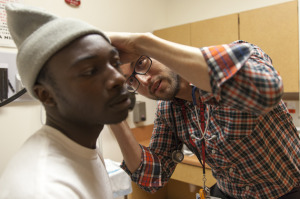For young people living in neighborhoods with limited resources, going to school not only means an opportunity to learn. It can also provide an opportunity for their first checkup.
Kaiser Permanente’s Thriving Schools supports nonprofit organizations that provide children and youth with a wide range of health care services—including routine physicals, dental exams and behavioral health counseling—all of which take place right on the school campus.
One such organization is La Clinica de La Raza, which opened its first school-based health center twenty-five years ago and now operates 32 health centers and dental sites throughout Northern California’s East Bay area. La Clinica de la Raza helps students get preventive care, cope with trauma and violence and manage chronic diseases like asthma, obesity and diabetes.
Oakland Unified School District’s coordinator for school health centers, Mara Larsen-Fleming, says that school-based clinics play a critical role in helping to keep students healthy and ready to learn.
“A lot of young people have things going on that are interfering with their ability to focus in class. Maybe they’re having trouble seeing the board, they’re suffering from a bad toothache or they’re grieving the loss of a loved one,” she explains
The Big Picture
Nearly 2,000 school-based health centers (SBHCs) operate nationwide; the majority are open every day school is in session . Most SBHCs are operated by Federally Qualified Health Centers and employ multidisciplinary teams that may include nurse practitioners, registered nurses, physician assistants, physicians, social workers, alcohol and drug counselors and others.
To learn more about SBHCs, visit the School Based Health Alliance website. You’ll find 7 Fundamental Principles for SBHCs that set a national standard for how SBHCs operate. You can also take a virtual tour of SBHCs in five states and download fact sheets with research on how SBHCs influence academic success and student mental health, and on the costs and benefits associated with the SBHC model.
According to the Health Resources and Services Administration, $200 million have been allocated thus far to SBHCs through the Affordable Care Act to modernize or build facilities, purchase equipment and increase access to services for more children.
School-based health centers make it easier for young people to make health a priority and to develop healthy habits that can last a lifetime.


